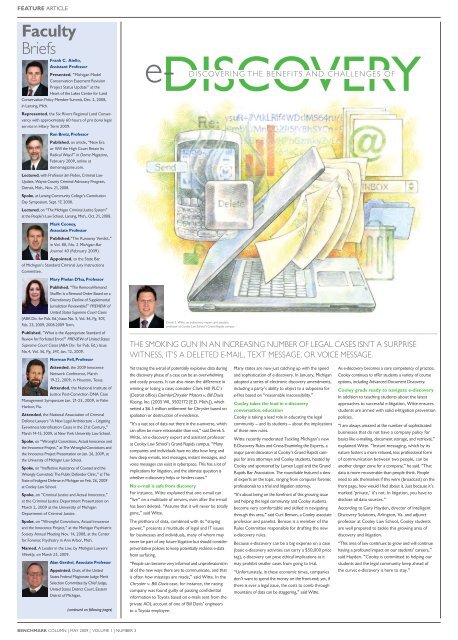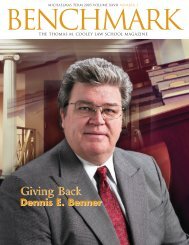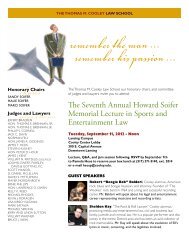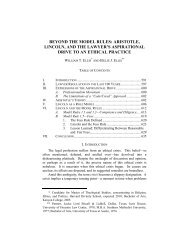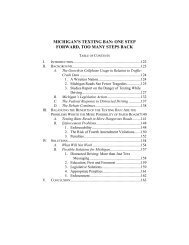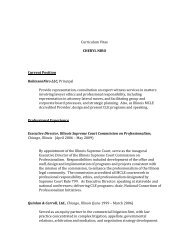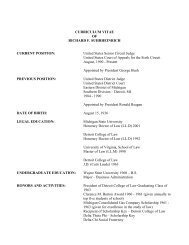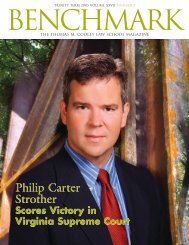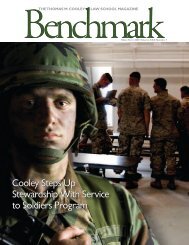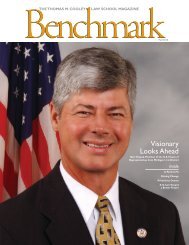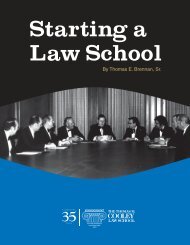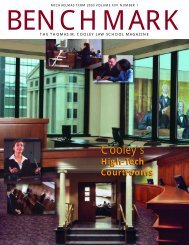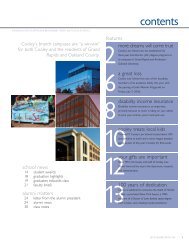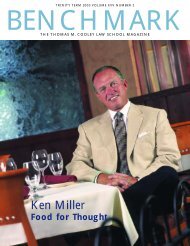Benchmark Column - May 2009 - Thomas M. Cooley Law School
Benchmark Column - May 2009 - Thomas M. Cooley Law School
Benchmark Column - May 2009 - Thomas M. Cooley Law School
Create successful ePaper yourself
Turn your PDF publications into a flip-book with our unique Google optimized e-Paper software.
FEATURE ARTICLEFacultyBriefsFrank C. Aiello,Assistant ProfessorPresented, “Michigan ModelConservation Easement RevisionProject Status Update” at theHeart of the Lakes Center for LandConservation Policy Member Summit, Dec. 2, 2008,in Lansing, Mich.Represented, the Six Rivers Regional Land Conservancywith approximately 60 hours of pro bono legalservice in Hilary Term <strong>2009</strong>.Ron Bretz, ProfessorPublished, an article, “New Eraor Will the High Court Retain ItsRadical Ways?” in Dome Magazine,February <strong>2009</strong>, online atdomemagazine.com.Lectured, with Professor Jim Peden, Criminal <strong>Law</strong>Update, Wayne County Criminal Advocacy Program,Detroit, Mich., Nov. 21, 2008.Spoke, at Lansing Community College’s ConstitutionDay Symposium, Sept. 17, 2008.Lectured, on “The Michigan Criminal Justice System”at the People’s <strong>Law</strong> <strong>School</strong>, Lansing, Mich., Oct. 21, 2008.Mark Cooney,Associate ProfessorPublished,”The Runaway Verdict,”in Vol. 88, No. 2 Michigan BarJournal. 40 (February <strong>2009</strong>).Appointed, to the State Barof Michigan’s Standard Criminal Jury InstructionsCommittee.Mary Phelan D’Isa, ProfessorPublished, “The Removal-RemandShuffle: Is a Remand Order Based on aDiscretionary Decline of SupplementalJurisdiction Reviewable?” PREVIEW ofUnited States Supreme Court Cases(ABA Div. for Pub. Ed.) Issue No. 5, Vol. 36, Pg. 307,Feb. 23, <strong>2009</strong>, 2008-<strong>2009</strong> Term.Published, “What is the Appropriate Standard ofReview for Forfeited Error?” PREVIEW of United StatesSupreme Court Cases (ABA Div. for Pub. Ed.) IssueNo.4, Vol. 36, Pg. 247, Jan. 12, <strong>2009</strong>.Norman Fell, ProfessorAttended, the <strong>2009</strong> InnocenceNetwork Conference, March19-22, <strong>2009</strong>, in Houston, Texas.Attended, the National Institute ofJustice Post-Conviction DNA CaseManagement Symposium Jan. 21-23, <strong>2009</strong>, in PalmHarbor, Fla.Attended, the National Association of CriminalDefense <strong>Law</strong>yers “A New Legal Architecture – LitigatingEyewitness Identification Cases in the 21st Century,”March 14-15, <strong>2009</strong>, at New York University <strong>Law</strong> <strong>School</strong>.Spoke, on “Wrongful Convictions, Actual Innocence andthe Innocence Project,” at The Wrongful Convictions andthe Innocence Project Presentation on Jan. 26, <strong>2009</strong>, atthe University of Michigan <strong>Law</strong> <strong>School</strong>.Spoke, on “Ineffective Assistance of Counsel and theWrongly Convicted; The Public Defender Clinic,” at TheState of Indigent Defense in Michigan on Feb. 26, <strong>2009</strong>at <strong>Cooley</strong> <strong>Law</strong> <strong>School</strong>.Spoke, on “Criminal Justice and Actual Innocence,”at the Criminal Justice Department Presentation onMarch 2, <strong>2009</strong> at the University of MichiganDepartment of Criminal Justice.Spoke, on “Wrongful Convictions, Actual Innocenceand the Innocence Project,” at the Michigan PsychiatricSociety Annual Meeting Nov. 14, 2008, at the Centerfor Forensic Psychiatry in Ann Arbor, Mich.Named, A Leader in the <strong>Law</strong>, by Michigan <strong>Law</strong>yersWeekly, on March 25, <strong>2009</strong>.Alan Gershel, Associate ProfessorAppointed, Chair, of the UnitedStates Federal Magistrate Judge MeritSelection Committee by Chief Judge,United States District Court, EasternDistrict of Michigan.(continued on following pages)e- DISCOVERYDISCOVERINGTHE BENEFITS AND CHALLENGES OFDerek S. Witte, an e-discovery expert and assistantprofessor at <strong>Cooley</strong> <strong>Law</strong> <strong>School</strong>’s Grand Rapids campusTHE SMOKING GUN IN AN INCREASING NUMBER OF LEGAL CASES ISN’T A SURPRISEWITNESS, IT’S A DELETED E-MAIL, TEXT MESSAGE, OR VOICE MESSAGE.Yet tracing the e-trail of potentially explosive data duringthe discovery phase of a case can be an overwhelmingand costly process. It can also mean the difference inwinning or losing a case; consider Clark Hill PLC’s(Detroit office) DaimlerChrysler Motors v. Bill DavisRacing, Inc. (2005 WL 3502172 [E.D. Mich.]), whichnetted a $6.5 million settlement for Chrysler based onspoliation or destruction of e-evidence.“It’s a vast sea of data out there in the e-universe, whichcan often be more retraceable than not,” said Derek S.Witte, an e-discovery expert and assistant professorat <strong>Cooley</strong> <strong>Law</strong> <strong>School</strong>’s Grand Rapids campus. “Manycompanies and individuals have no idea how long andhow deep e-mails, text messages, instant messages, andvoice messages can exist in cyberspace. This has a lot ofimplications for litigation, and the ultimate question iswhether e-discovery helps or hinders cases.”No e-mail is safe from discoveryFor instance, Witte explained that one e-mail can“live” on a multitude of servers, even after the e-mailhas been deleted. “Assume that it will never be totallygone,” said Witte.The plethora of data, combined with its “stayingpower,” presents a multitude of legal and IT issuesfor businesses and individuals, many of whom maynever be part of any future litigation but should considerpreventative policies to keep potentially reckless e-datafrom surfacing.“People can become very informal and unprofessional inall of the new ways there are to communicate, and thatis often how missteps are made,” said Witte. In theChrysler v. Bill Davis case, for instance, the racingcompany was found guilty of passing confidentialinformation to Toyota based on e-mails sent from theprivate AOL account of one of Bill Davis’ engineersto a Toyota employee.Many states are now just catching up with the speedand sophistication of e-discovery. In January, Michiganadopted a series of electronic discovery amendments,including a party’s ability to object to a subpoena fore-files based on “reasonable inaccessibility.”<strong>Cooley</strong> takes the lead in e-discoveryconversation, education<strong>Cooley</strong> is taking a lead role in educating the legalcommunity – and its students -- about the implicationsof these new rules.Witte recently moderated Tackling Michigan’s newE-Discovery Rules and Cross-Examining the Experts, amajor panel discussion at <strong>Cooley</strong>’s Grand Rapids campusfor area attorneys and <strong>Cooley</strong> students, hosted by<strong>Cooley</strong> and sponsored by Lumen Legal and the GrandRapids Bar Association. The roundtable featured a slewof experts on the topic, ranging from computer forensicprofessionals to a trial and litigation attorney.“It’s about being on the forefront of this growing issueand helping the legal community and <strong>Cooley</strong> studentsbecome very comfortable and skilled in navigatingthrough this area,” said Curt Benson, a <strong>Cooley</strong> associateprofessor and panelist. Benson is a member of theRules Committee responsible for drafting the newe-discovery rules.Because e-discovery can be a big expense on a case(basic e-discovery activities can carry a $50,000 pricetag), e-discovery can pose ethical implications as itmay prohibit smaller cases from going to trial.“Unfortunately, in these economic times, companiesdon’t want to spend the money on the front-end; yet, ifthere is ever a legal issue, the costs to comb throughmountains of data can be staggering,” said Witte.As e-discovery becomes a core competency of practice,<strong>Cooley</strong> continues to offer students a variety of courseoptions, including Advanced Document Discovery.<strong>Cooley</strong> grads ready to navigate e-discoveryIn addition to teaching students about the latestapproaches to successful e-litigation, Witte ensuresstudents are armed with solid e-litigation preventionpolicies.“I am always amazed at the number of sophisticatedbusinesses that do not have a company policy forbasics like e-mailing, document storage, and retrieval,”explained Witte. “Instant messaging, which by itsnature fosters a more relaxed, less professional formof communication between two people, can beanother danger zone for a company,” he said. “Thatdata is more recoverable than people think. Peopleneed to ask themselves if this were (broadcast) on thefront page, how would I feel about it. Just because it’smarked ‘private,’ it’s not. In litigation, you have todisclose all data sources.”According to Gary Hayden, director of IntelligentDiscovery Solutions, Arlington, Va. and adjunctprofessor at <strong>Cooley</strong> <strong>Law</strong> <strong>School</strong>, <strong>Cooley</strong> studentsare well prepared to tackle this growing area ofdiscovery and litigation.“This area of law continues to grow and will continuehaving a profound impact on our students’ careers,”said Hayden. “<strong>Cooley</strong> is committed to helping ourstudents and the legal community keep ahead ofthe curve; e-discovery is here to stay.”BENCHMARK COLUMN | MAY <strong>2009</strong> | VOLUME 1 | NUMBER 2


